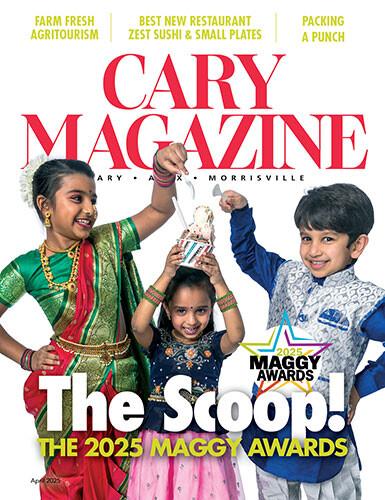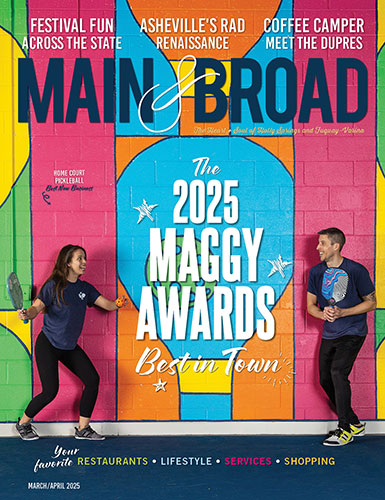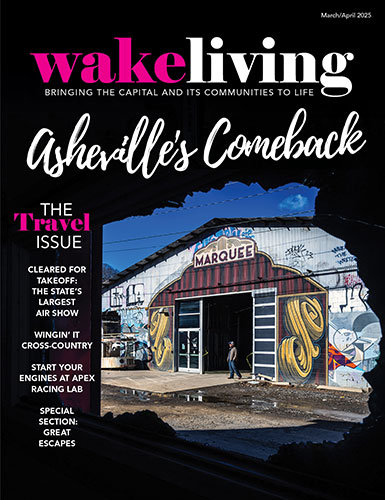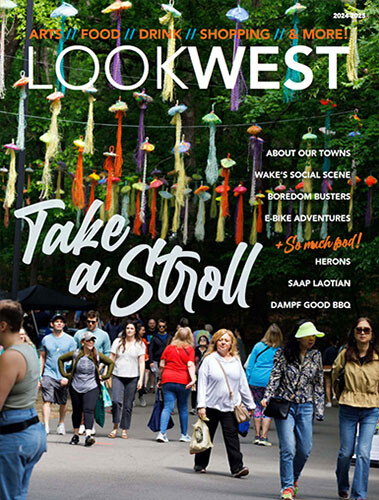Patch Walters
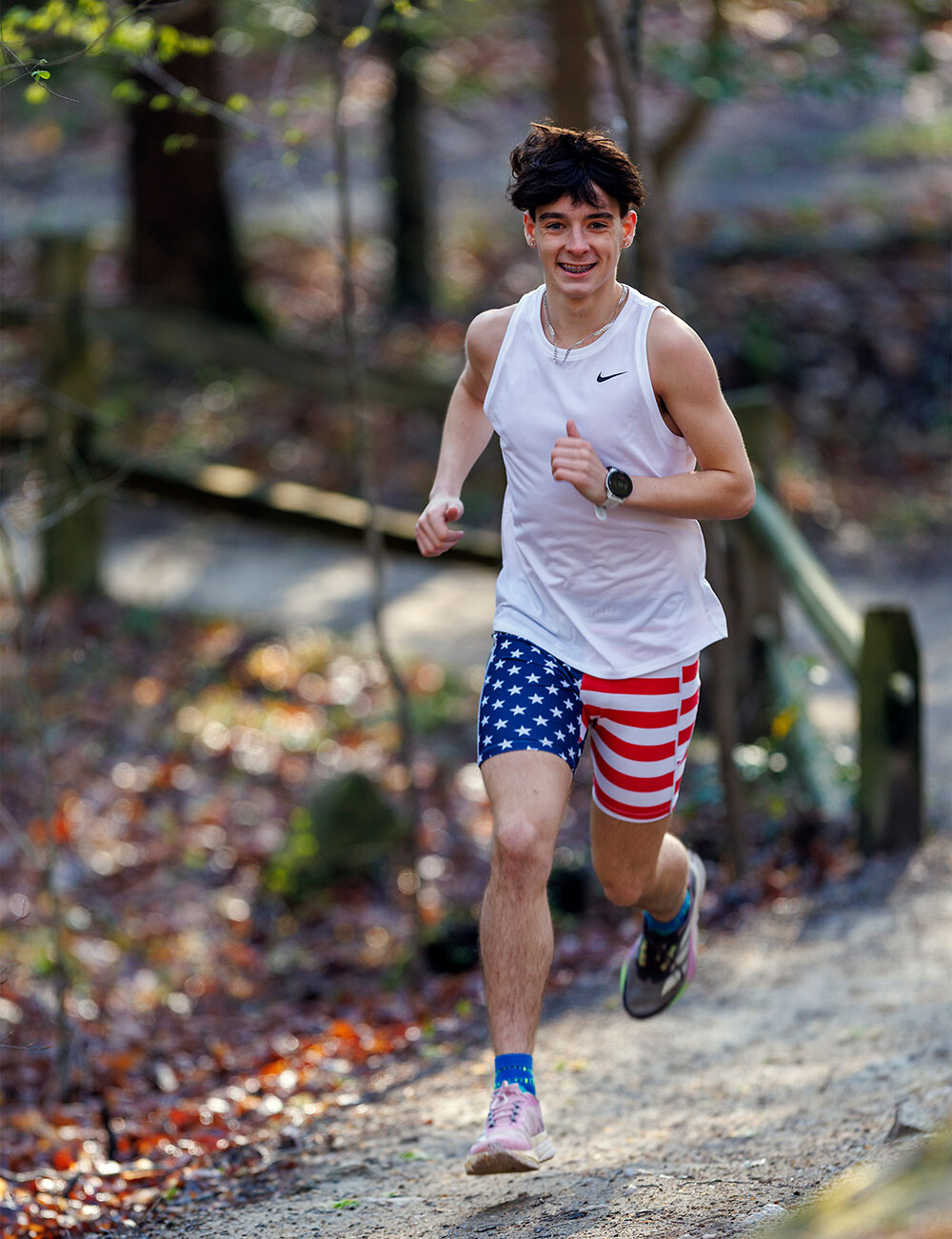
William B. Umstead State Park is home to some of Walters’ favorite running trails.
Patrick “Patch” Walters is a planner. So, when he was running the biggest race of his athletic career and found himself in what he described as “too much pain,” he and his parents knew it was time for his “plan B shoes.” Thankfully, the shoe change did the trick over the long stretch of flat he was facing, as Walters was not only able to finish the race — but finish as its youngest runner.
The race in question? The JFK 50 Mile, an annual ultramarathon that takes place in Maryland and brings out elite runners to test their mettle. As America’s oldest ultramarathon, the race started in 1963 as part of President John F. Kennedy’s challenge to improve the physical fitness of the nation. The JFK 50 was founded by a North Carolina native, and while the initiative included multiple race locations at the outset, the Maryland course — which gains 1,172 feet in elevation within the first 5.5 miles alone, spans rocky sections of the Appalachian Trail, and drops over 1,000 feet in a series of steep and treacherous switchbacks — is the only original event that continues to be held every year.
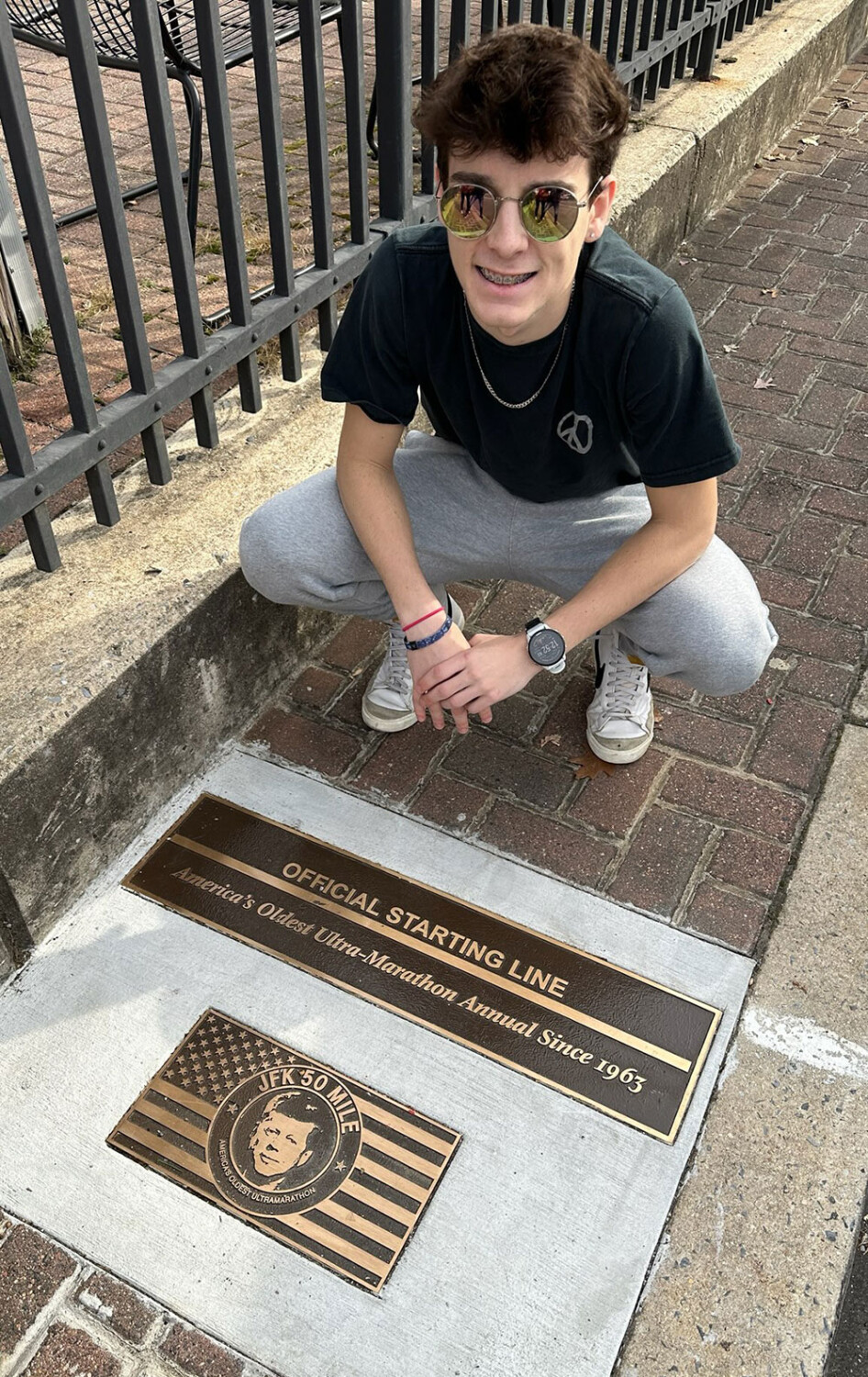
The JFK 50 Mile remains the only of the original 1963 ultramarathons to be held annually. Contributed photo.
Among the runners for the 61st iteration in November 2023 was 16-year-old Walters, who considers the race a stepping stone toward the goal he voiced while in ninth grade: “I want to run a 100-miler by the end of high school.”
And as far as his parents Elizabeth and Chad are concerned, there is no reason he won’t accomplish his goal. “Walters has definitely got grit,” Elizabeth shared. “He’s determined and perseveres through difficulties.”
For Walters, those difficulties came in the form of a cystic fibrosis diagnosis at 5 years old.
Being born before North Carolina instituted heel prick testing that would have detected the rare genetic disease that affects the lungs and digestive system meant that it would be an allergist who’d suggest the otherwise healthy and energetic Walters be tested for CF to see if it could account for his symptoms.
Walters’ parents attribute some of his endurance to the diagnosis, as at 5 he knew that his routine included lengthy daily treatments and long quarterly hospital appointments that his older brother and other kids didn’t have.
Despite CF historically being a disease with a life expectancy of only five years, Walters is now on just one oral medication and thriving physically. When covid hit at the end of sixth grade, soccer player Walters and his dad started running to “get out of the house.” Despite being novices — wearing basketball shoes for their early runs — Chad was “thrilled that Walters wanted to start running and encouraged him to pursue running for the aerobic exercise and the benefits it would have for clearing his lungs.”
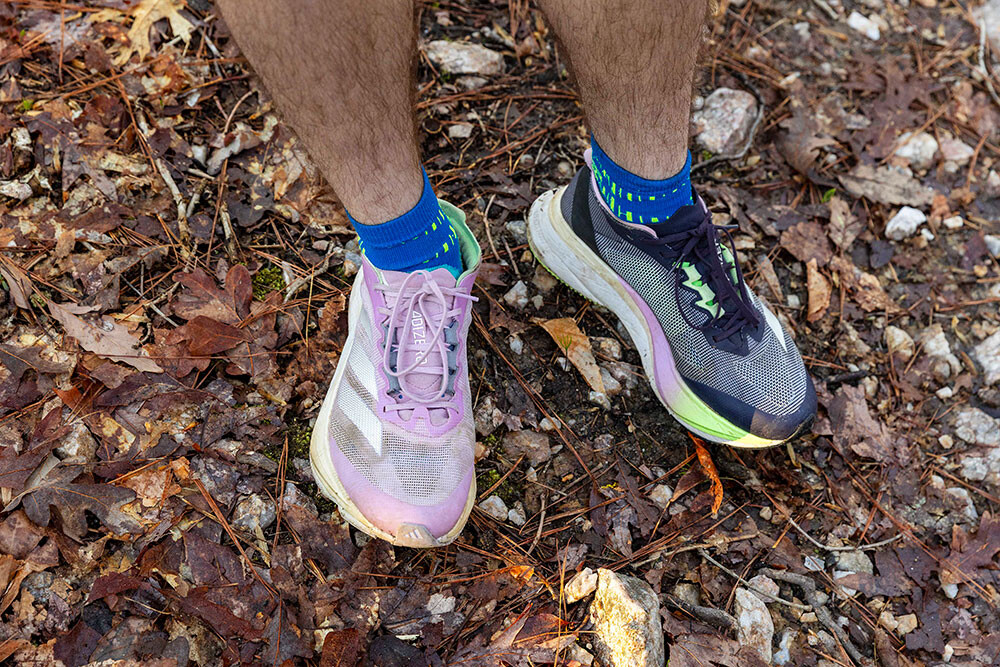
If the shoe fits and is fashionable — even different pairs — Walters will lace them up for his long runs at Umstead Park.
But then Walters began to run longer distances after starting track in the seventh grade and cross-country in the eighth. After placing well in races and winning the Most Improved and Track Coach’s Awards at GRACE Christian School, it became clear that the planner had even bigger plans.
When it comes to having CF and running long distances, Walters knew the expectation of others would be that he “won’t be as fast and his lungs won’t keep up.” But Patch likes to prove others wrong.
Katie Horton, Walters’ cross-country and track and field coach, met him “on the track before I even had a chance to coach him. He was a seventh-grade boy fearlessly running hurdles, and I immediately spotted that he had a talent.”
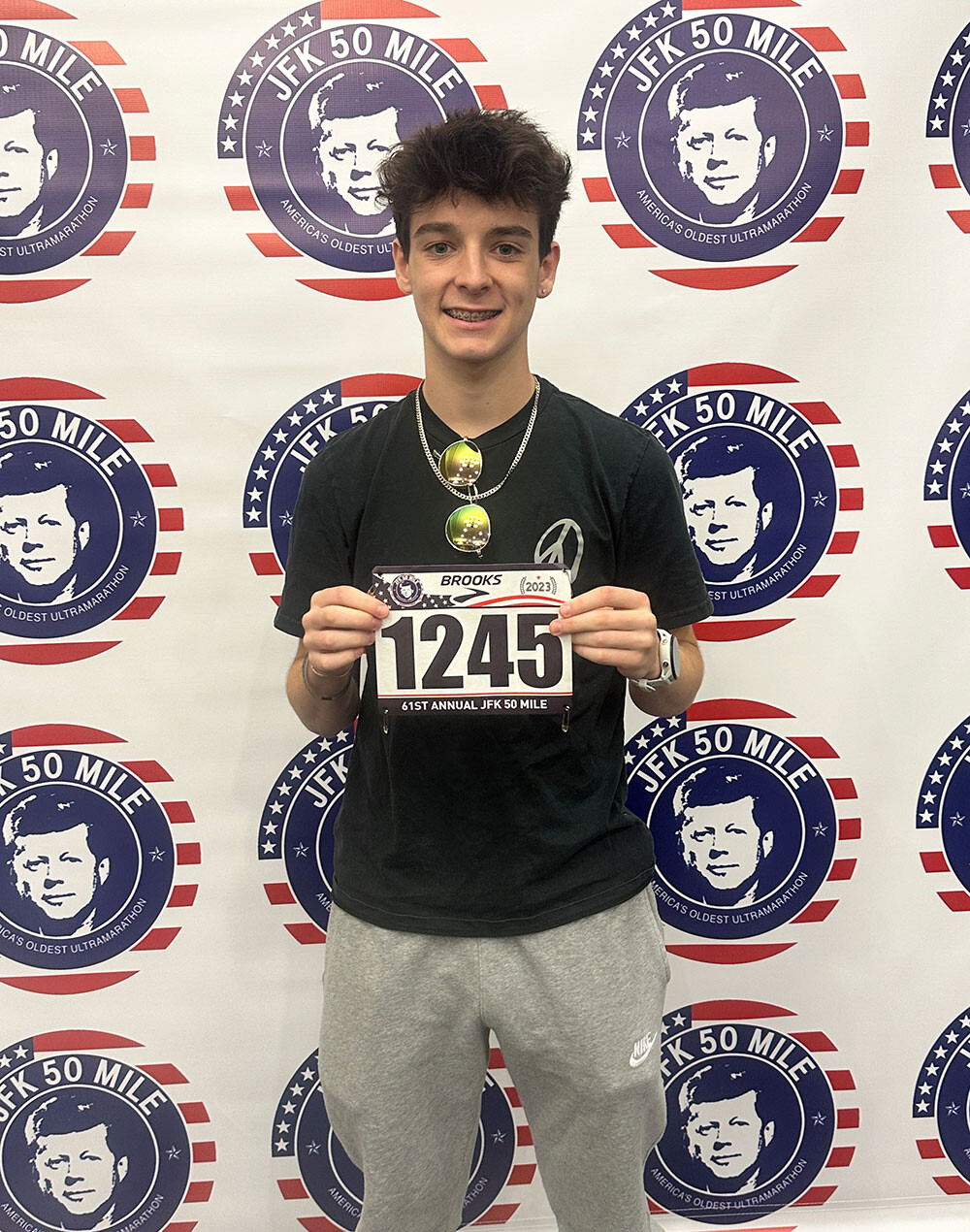
As the youngest race finisher,
Walters proved cystic fibrosis can’t slow him down. Contributed photo.
But Walters isn’t reckless. He doesn’t simply see goals — he wants to understand them. Whether it’s changing up the kinds of runs he does, scrutinizing his nutrients, or training for an ultramarathon without music because the race bans AirPods, Walters approaches every goal with the logic and meticulousness that will serve him well should he study mechanical engineering in college as he plans.
“Patch is still the same brave kid that I saw jumping hurdles on the track,” Horton explained, “but what I’ve grown to learn about Walters is that he doesn’t tackle the hard tasks without fear. In fact, most of the time he’s terribly intimidated by the challenge, but what makes him so brave is that he still pursues his goals despite his fear.”
Indeed, Walters isn’t immune to the worry that comes from dips in his lung function, so he hopes that his achievements raise awareness of the need for continued medical advancements and an eventual cure for CF.
Elana O’Connell, founder of the Joey O Bocce Classic, which has raised $600,00 for CF, has no doubts in that regard. After first meeting Walters at the event when he was 8, O’Connell went to see him run his first marathon years later. “I saw the future of a cure!” O’Connell explained. “Patch was our hope that a cure for CF was imminent.”
Despite describing Walters as modest and humble — traits that align with his desire to schedule his longest training runs on weekends to keep his weekdays free for runs with friends — O’Connell is clear about his influence: “Patch is a hero in my eyes. I don’t believe kids with CF had someone like Patch to look up to. They see him and think to themselves, Why not me? I can do that!”
In the meantime, Walters continues to cover the miles in search of his next opportunity.
Ava Grivalski
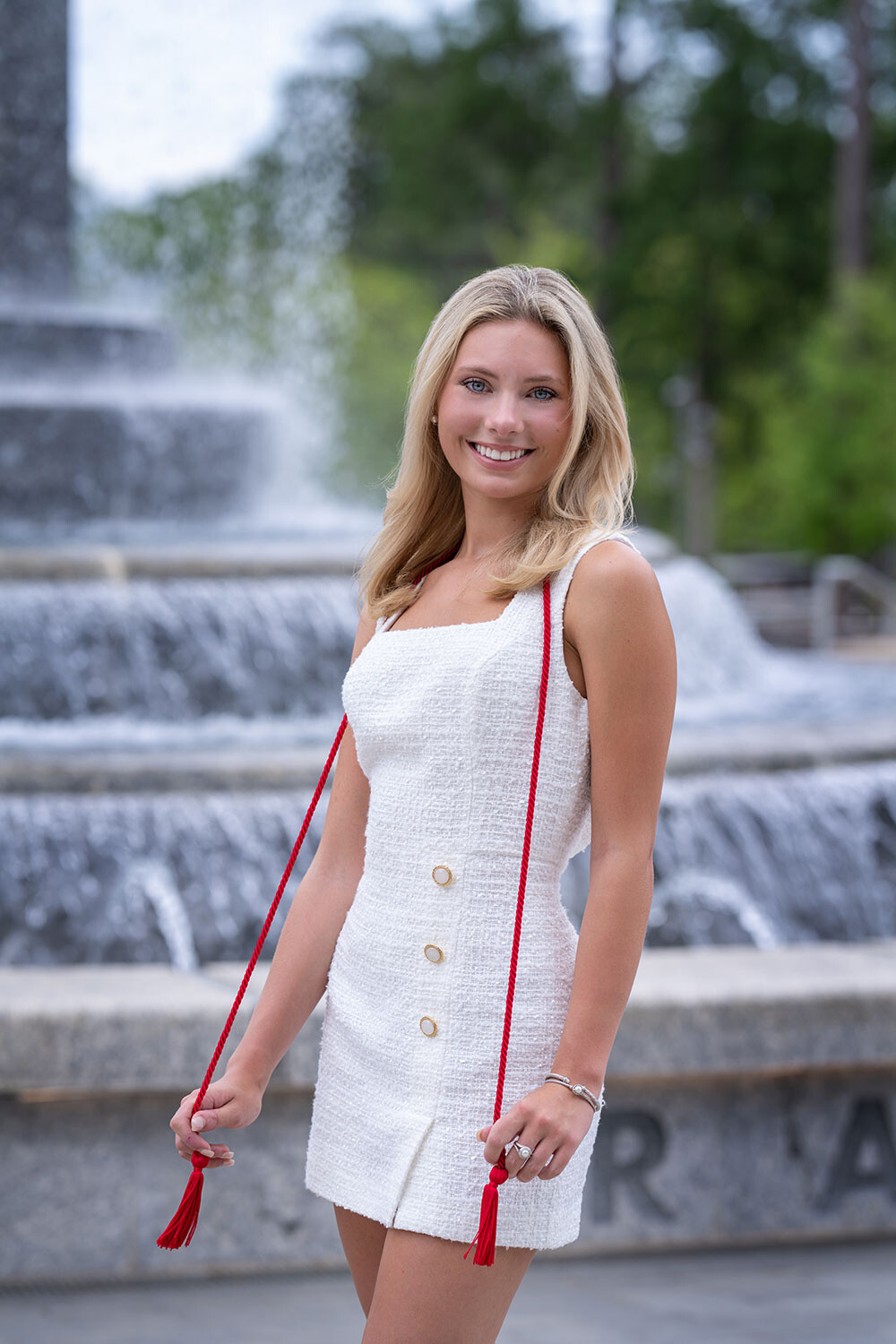
To signify her lifesaving act, at graduation Ava wore the red honor cord she earned from The Blood Connection.
Recent Cardinal Gibbons High School graduate Ava Grivalski knows that with every blood donation you make, you are helping to save three lives. What she couldn’t have anticipated was that one of those lives may well have been her mother’s.
Grivalski and her mom, Leslie Moore-Martinez, have what they consider an “unusual story” when it comes to Grivalski’s charity commitment. In 2021, she was introduced to the Kay Yow Cancer Fund when the two stopped at the Apex Chick-fil-A and saw a hot-pink boat being being raffled off in support of the Fund. Intrigued, Grivalski took to social media to learn more about the Fund, which has raised $8 million since Coach Yow — the North Carolina State University Hall of Fame basketball coach who battled breast cancer for the last 22 years of her career — established it in 2007.
A conversation started when Moore-Martinez shared with Grivalski that two of her aunts, whom Grivalski had never met, had passed away from cancer. To honor these family members, the mother-daughter pair purchased raffle tickets. After they won the raffle — and the one-of-a-kind pink Savannah boat — they spent a lot of time boating on Jordan Lake and in the Wilmington area. The joke was that because they shared their story with everyone they met, they were the unofficial ambassadors of the Kay Yow Cancer Fund.
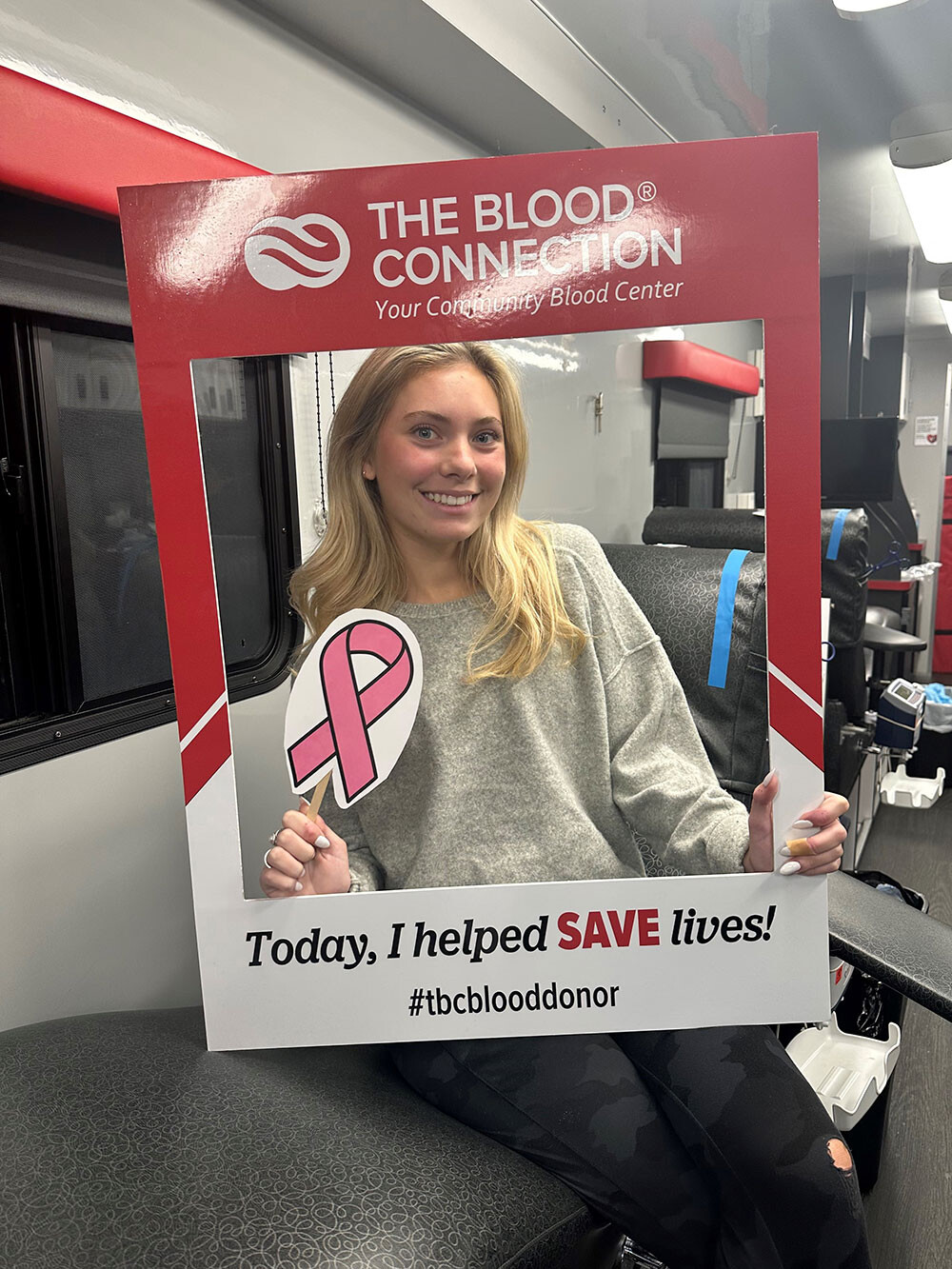
Every donation of blood saves several lives. Contributed photo.
What they could never have predicted was that the next year Moore-Martinez would be diagnosed with a rare form of breast cancer.
Part of her treatment included chemotherapy, and Grivalski learned that a blood transfusion may be necessary. She was surprised to discover that cancer patients are the greatest recipients of blood transfusions.
So, out of compassion for her mom, Grivalski decided to donate blood. “I have to admit I was scared to donate,” she acknowledged, “but the process was so easy, and it didn’t hurt at all.” After making several donations to the blood bank, Grivalski was eager to make a bigger impact.
Enter the Kay Yow Cancer Fund.
It wasn’t until Grivalski started donating regularly to The Blood Connection — her first donation made at a drive held at her school shortly after her mom’s diagnosis — that she discovered there was a charity giveback option available. “I immediately knew I wanted to donate to the Kay Yow Cancer Fund,” Grivalski acknowledged. “I love that their mission is to support women with all cancers and that they help the underserved with mobile mammograms.”
Not only could Grivalski support the blood bank, but she could donate to a cancer-specific organization. “I was able to make twice the impact,” she said.
With her first blood drive, and after finding the process of organizing a drive “very easy” thanks to The Blood Connection’s coordinator and a venue in the form of the Cary preschool her mom owns, Grivalski was able to engage families and staff and facilitate 38 donations — which could save 114 lives — and raise $1,000 in honor of cancer patients.
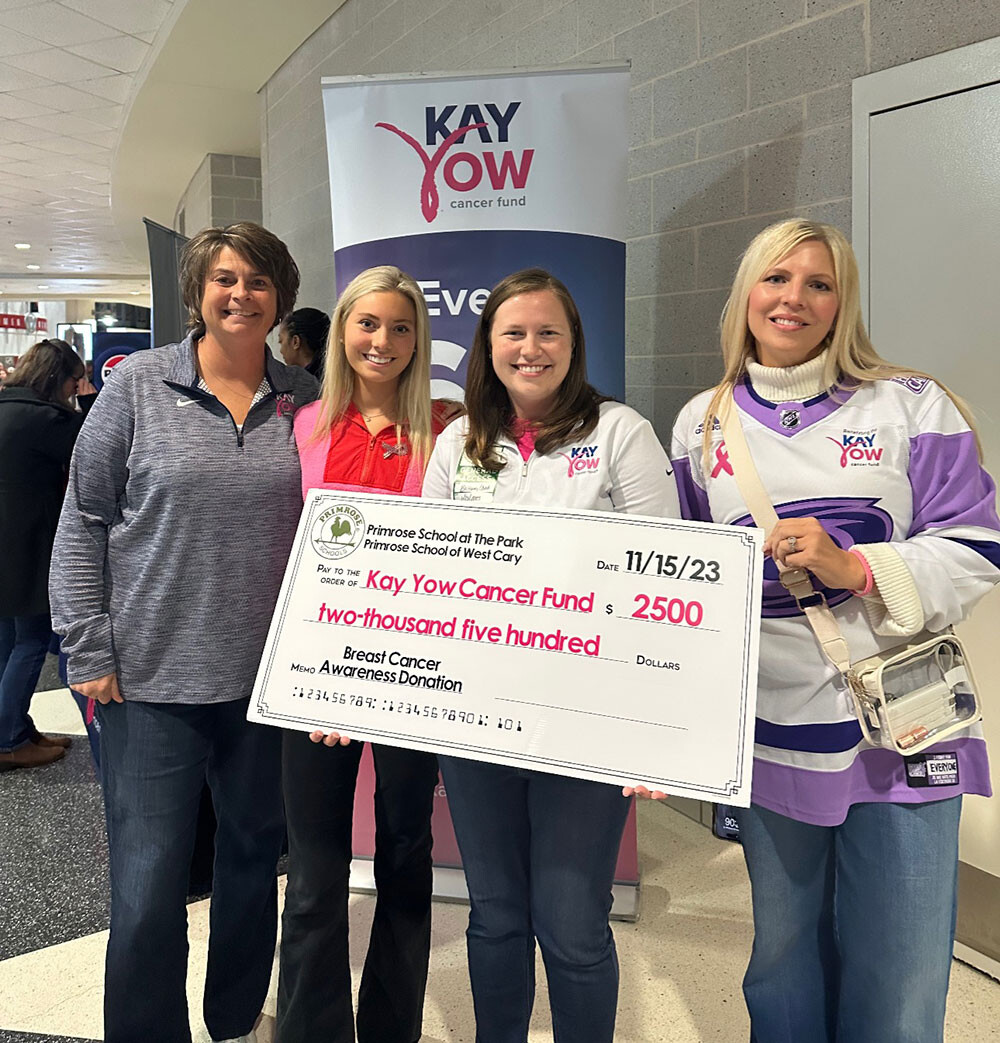
Grivalski is honored to continue supporting the Kay Yow Cancer Fund. Contributed photo.
Considering it a “full-circle moment” to hand-deliver the donation to the Fund alongside her mom, Grivalski met with CEO Jenny Palmateer, who offered her an opportunity she considers “truly life-changing.”
In a “first for the Fund,” Grivalski and Moore-Martinez were invited to be co-chairs — the first ever mother-daughter duo — of one of the Fund’s biggest events, the Celebration Run/Walk held at WakeMed Soccer Park and hosted by NC Courage. Grivalski knew she had the chance to help support women with cancer in a “meaningful” way.
“I think I will remember that day forever,” Grivalski said about the event, which took place February 3. At the “celebration of cancer survivors, thrivers, caregivers, and those in the fight to end all cancers affecting women,” $150,000 was raised and a record attendance achieved. Grivalski was also asked to give a speech. As the Presidential Academic and Communications Fellows scholarship recipient from Elon University and with plans to double major in Strategic Communications and International Business this fall — and having wanted to speak publicly since middle school — Grivalski feels “incredibly proud” to have helped build awareness in such a visible way.
With college drawing near, Grivalski hopes to find ways to engage students not only with blood drives but as a part of the education process in support of cancer patients and research. She also plans to intern for the Kay Yow team, and every blood drive she hosts will continue to support the Fund. Grivalski’s advice to other teens is therefore fitting: “Focus on something that is important to you. When you connect with an organization or a charity, giving truly comes from the heart.”
About her legacy of helping women, Coach Yow once said: “I normally shun the spotlight, but I don’t mind being the platform.” For her part, Grivalski is “so proud to have been a part of what [Yow] created” and is grateful for the constant support and inspiration of her mom, who has achieved remission.
Harshil Garg
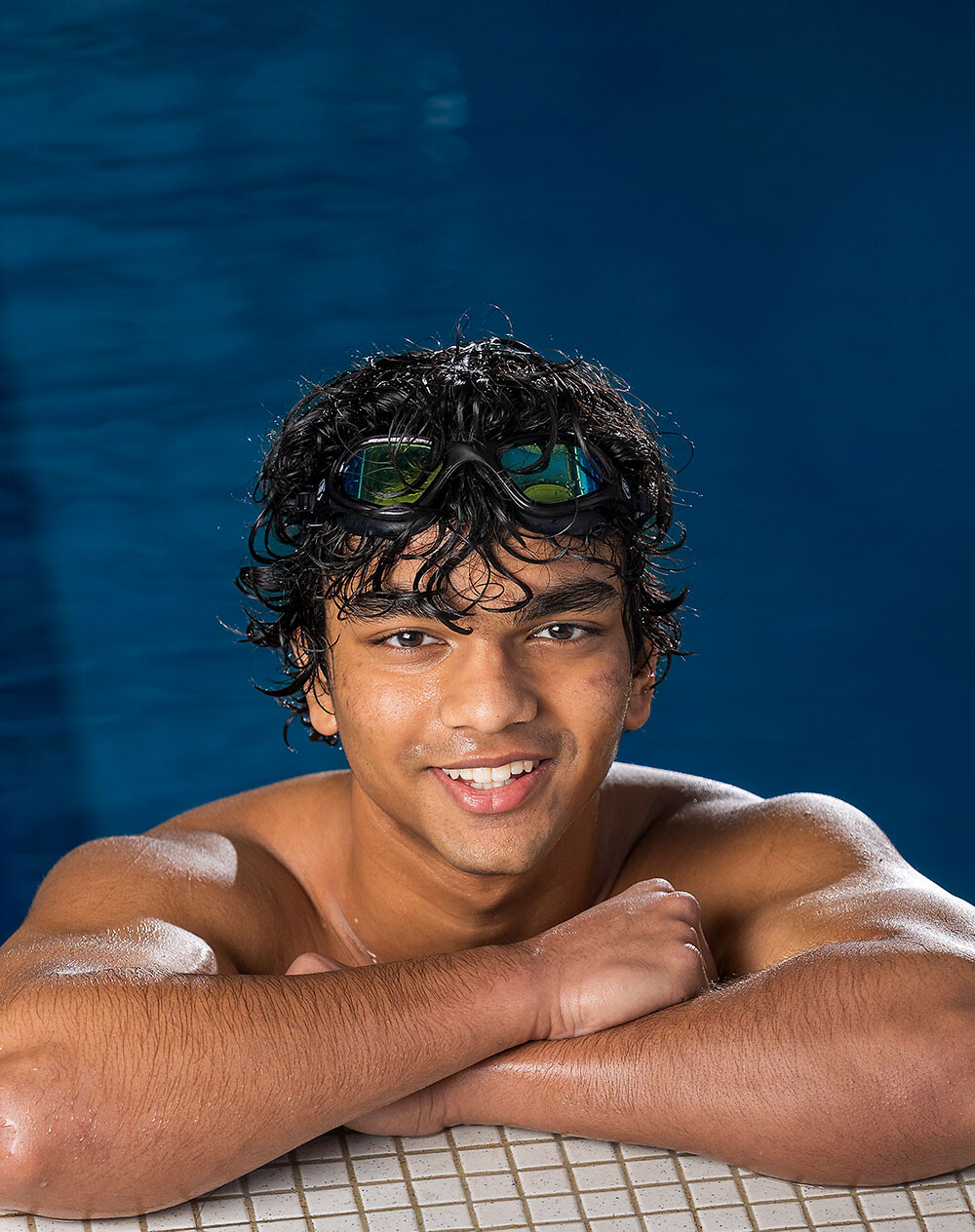
Harshil Garg hopes to become a third-generation MBA. Yet, unlike his grandfather and his father, Madhur — who expressed that his son “sees things differently” — Garg wants to use his education to explore how the world of investing can be opened to the disadvantaged.
The rising senior at Green Level High, who plans to major in Business Studies at UNC’s Kenan-Flagler Business School, already has the necessary savvy to recognize that he must earn money for himself, as he explained, if he wants to “have enough to share with others in a meaningful way.”
And sharing with others seems to be what compelled Garg to launch Project Aqua-Survivors — an initiative aimed at teaching water awareness to the area’s underprivileged children.
Already concerned about the National Safety Council statistic that recognizes drowning as the second leading cause of unintentional injury death for children under the age of 15, Garg drew inspiration from Swim Tayka, an organization that provides free swimming lessons to the underprivileged children of the world living along open waters.
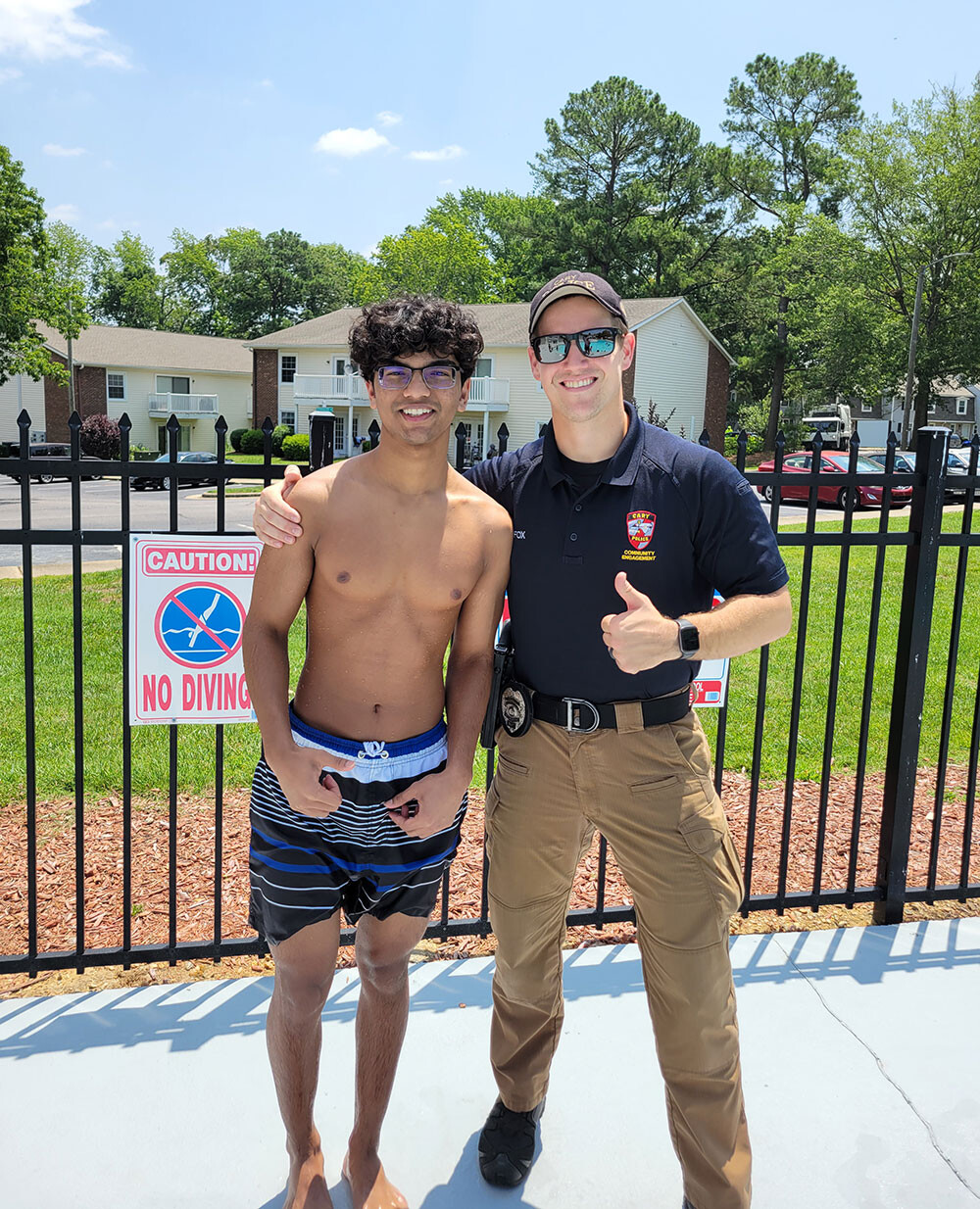
Garg’s comfort in the water propels him to help others decrease their fear. Contributed photo.
And when it comes to swimming — a sport Garg started at age 5 when he moved from India to New Hampshire and continued with the Triangle Aquatic Center when his family relocated to Cary at 8 — his thinking about water safety took a similarly different approach.
“I didn’t really know where to start,” Garg admitted, after realizing that the YMCA where he worked out already had its own program and required children to be onsite for lessons. “One thing led to another,” Garg said, and “I finally found Project PHOENIX after talking to the school resource officer.”
Project PHOENIX (Promoting Healthy Occupancy through Education, Networking, and Information eXchange) is an alliance between the Cary Police Department and Town that partners officers with apartment neighborhoods to maintain safety and foster a sense of community.
When Garg met with Sergeant Dustin Wright, his contact at Project PHOENIX, the officer asked him a critical question: For someone to not drown, is it important that they know how to swim?
“When I started discussing my ideas and what I wanted to do with Sgt. Wright,” Garg explained, “he helped evolve it. He volunteered manpower; he volunteered publicity and outreach in the communities that he already worked with as part of Project PHOENIX. Essentially, I got the platform on top of which I could then build my program.”
And after his thinking shifted to “how not to drown” from the conventional “how to swim,” and under the aegis of Project PHOENIX, Garg knew he could accomplish something impactful for a wider audience in a shorter duration.
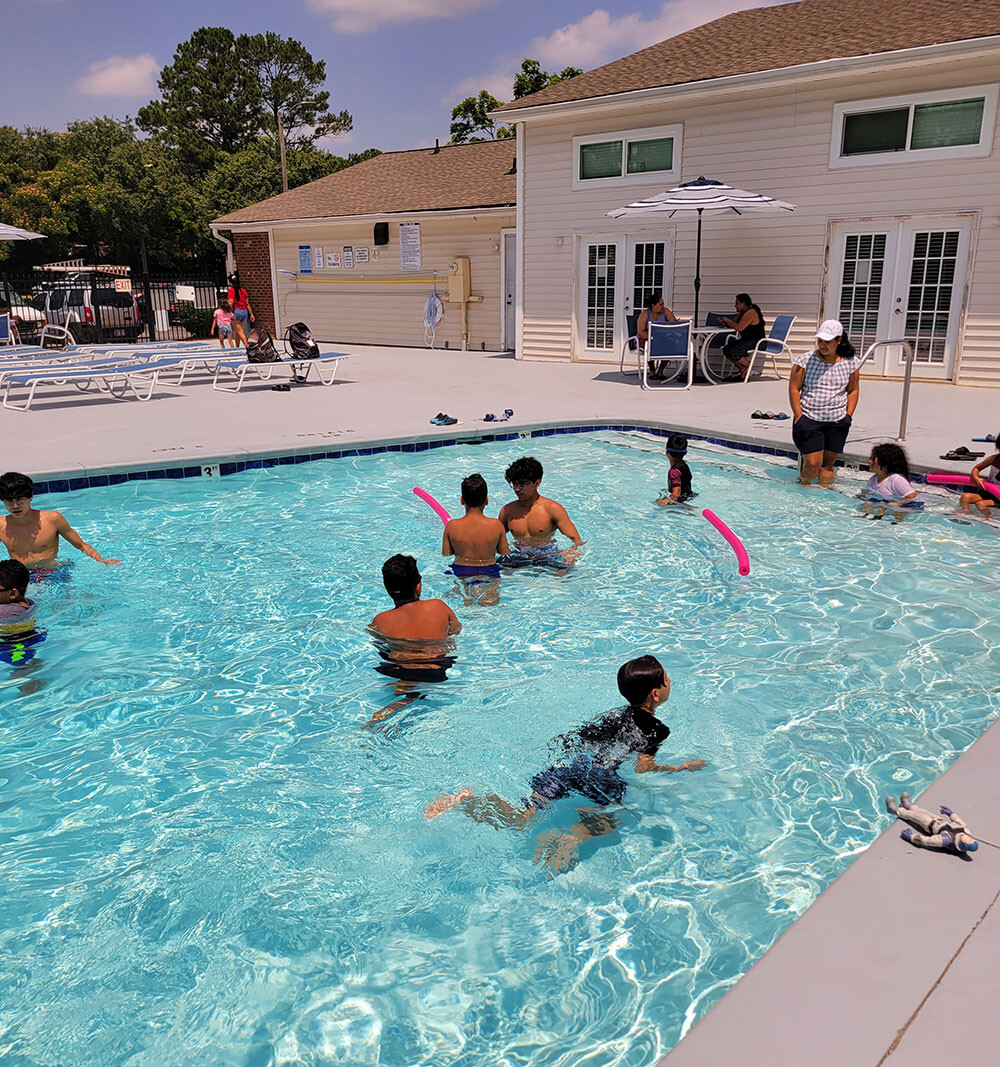
Project Aqua-Survivors’ summer sessions target underserved youth. Contributed photo.
The first step was to raise funds. While charitable donations were an option, Garg decided to rely on his swimming skills. Knowing that he connects well with kids, throughout the summer of 2022 Garg offered swim coaching to kids who could afford to pay. The mother of two boys described her sons’ time with Garg as “a fun and fruitful experience for my family,” with her younger son becoming comfortable enough to put his face in the water and the older learning “a whole deal about breath control and pushing through the length of the pool.” Coaching 10 kids that summer earned Garg $1,200 — enough money to kick off Project Aqua-Survivors.
In his sophomore year, Garg finalized the execution details of Project Aqua-Survivors, which would run during the summer of 2023. Two underprivileged Cary apartment communities — Merriwood and Williamsburg Manor — were shortlisted, and Garg settled on the competencies required to help anticipate, avoid, and survive common drowning situations.
Thanks to Project PHOENIX’s continued support in the form of community advertising and the provision of a lifeguard at the three hourlong sessions conducted in the apartment pools — along with the money Garg raised the previous summer, which was used to buy coaching equipment, swim goggles, and US Coast Guard-approved life vests — the program saw high participation. A total of 18 children attended one or more session. Perhaps recognizing Garg’s desire for participants to reduce their fear of water, several parents expressed an interest in taking part in adult-level classes should they become available.
For Sgt. Wright, who was immediately supportive of Garg’s idea to bring water awareness to the doorstep of an underserved population, and who was already familiar with the number of deaths in Cary alone due to drowning, Project Aqua-Survivors was a resounding success.
On Garg’s part, and after being named The Triangle Nonprofit & Volunteer Leadership Center’s 2024 Key Volunteer of the Year, the hope is to create a “pipeline of compassionate coaches from the high schools in the area,” who will ensure that the summer program continues after he graduates.
Garg’s ongoing concern for water safety among those who can’t swim has never abated; if anything, making an actionable difference has strengthened his desire to prevent everyday deaths from drowning.
“I know that there are many other swimmers like me who would like to give back to society in a meaningful way using their skills,” he affirmed, “but not everyone is fortunate to find the means to do so. I want to be able to provide them with that opportunity.”
- Introducing Cary Magazine’s 2024 Movers & Shakers
- Notable Teens 2024
- Garden Adventurer: Cuban Oregano 101
- Liquid Assets: Lunch Break: Peanut Butter and Grape Jelly
- Liquid Assets: Where’s My Floatie
- Dampf Good BBQ
- Nonprofit Spotlight: Kids Together Playground
- Small Business Spotlight: Hunky Dory Record Shop
- E-Bike Adventures
- On Trend: Olympic Games, Home Edition
- Things to Do: June / July 2024
